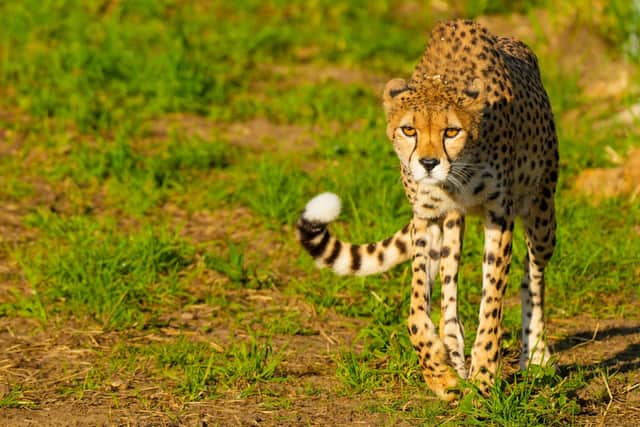Yorkshire Wildlife Park: Endangered cheetahs latest arrivals at popular park
and live on Freeview channel 276
Darcy and Brooke are settling into the newly-developed Cheetah Territory that covers 10,000 square metres of specially designed habitat and opens on Friday.
The award-winning park is a leading force in animal conservation and is already home to endangered Amur leopards and Amur tigers. The big cat collection also includes rescued African lions.
Advertisement
Hide AdAdvertisement
Hide AdDarcy, who is four-years-old, travelled from Ireland’s Fota Wildlife Park while 13-year-old male Brooke arrived from the Bristol Zoo Project as a recommendation by the European Endangered Species Programme.


The habitat comprises three new reserves and two houses, forming a breeding complex which at approximately 2.5 acres is believed to be the largest in Europe.
The landscape is enriched with lots of trees, rocks, sandy areas to relax, caves and lookout points which are expected to be popular with the new arrivals.
Dr Charlotte Macdonald, Director of Animals at the 260-acre park at Auckley, said: “Cheetah have excellent sight and can see prey up to three miles away.
Advertisement
Hide AdAdvertisement
Hide Ad“Both Darcy and Brooke are settling in well to Cheetah Territory. In the wild, female cheetahs are solitary and this only changes when caring for their cubs, whilst males are more social and will live in all male groups called coalitions.
“Cheetah Territory reflects this by housing Brooke and Darcy separately, as they would in the wild. The reserve has separate male and female savannah grassland inspired areas where they can run and roam and ‘homes’ where they can withdraw to rest and sleep.”
Cheetahs are regarded as one of the oldest of the world’s big cat species and were considered sacred by the Egyptians.
Today, they are considered vulnerable by the IUCN with around 7,100 estimated to live in the wild. Their numbers are under threat from habitat loss, poaching and pollution.
Advertisement
Hide AdAdvertisement
Hide AdIt was once one of the most wide-spread carnivores on the planet but is now mainly confined to Southern Africa with small numbers in East and North Africa and a population of less than 30 in Iran.
Yorkshire Wildlife Park and the WildLive Foundation will be supporting cheetah conservation in the wild raising awareness and supporting initiatives with conservation partners.
Renowned as the fastest land animal on the planet, cheetahs can reach speeds of up to 75mph for short periods (and can reach 60mph in three seconds). As a comparison, Usain Bolt is known as the world’s fastest man and he can reach speeds of 27mph.
The cheetah is physically adapted for speed with an aerodynamic shape, light frame and long legs.
Advertisement
Hide AdAdvertisement
Hide AdIts spine is superbly flexible which combined with its ‘free floating’ shoulder blades (not attached to the collar bone) allows for extreme extension.
Park CEO John Minion said: “Yorkshire Wildlife Park’s mission centres on wildlife conservation, education, and animal welfare whilst providing a safe and natural habitat for endangered species.
“Visitors to the park will have the opportunity to observe these incredible cats up close, while also learning about the challenges they face in the wild and how they can actively contribute to their conservation.”
Comment Guidelines
National World encourages reader discussion on our stories. User feedback, insights and back-and-forth exchanges add a rich layer of context to reporting. Please review our Community Guidelines before commenting.